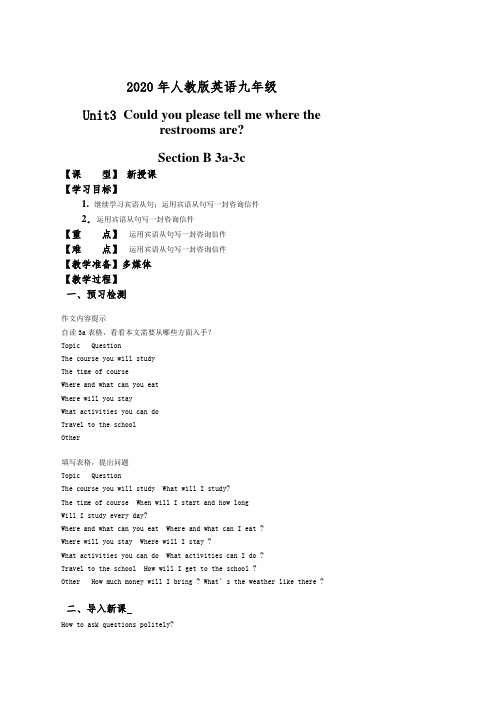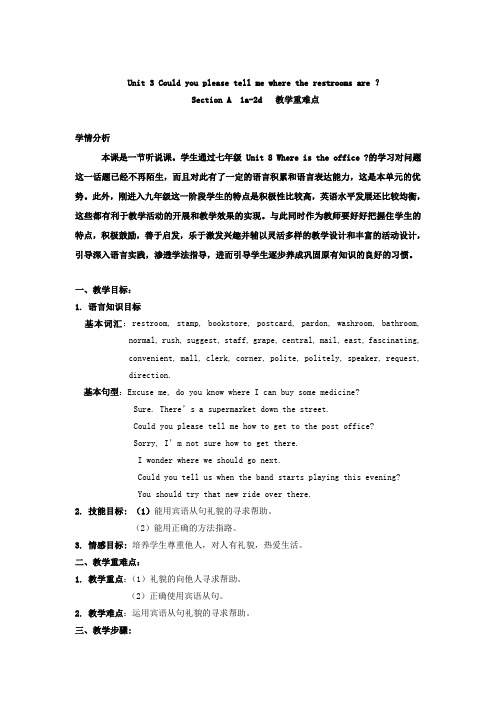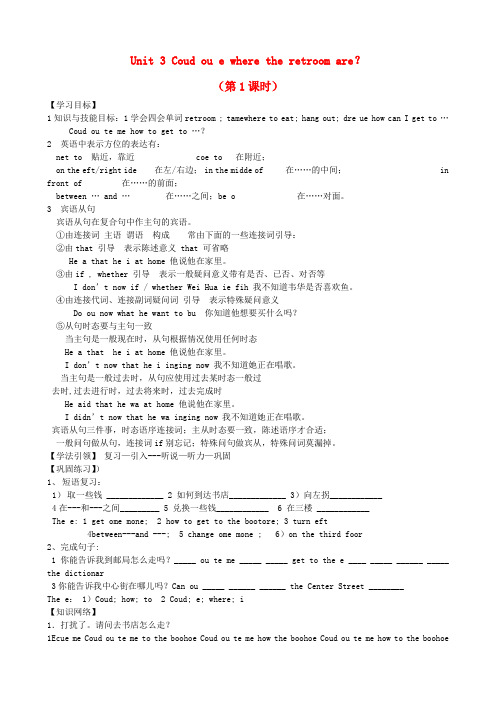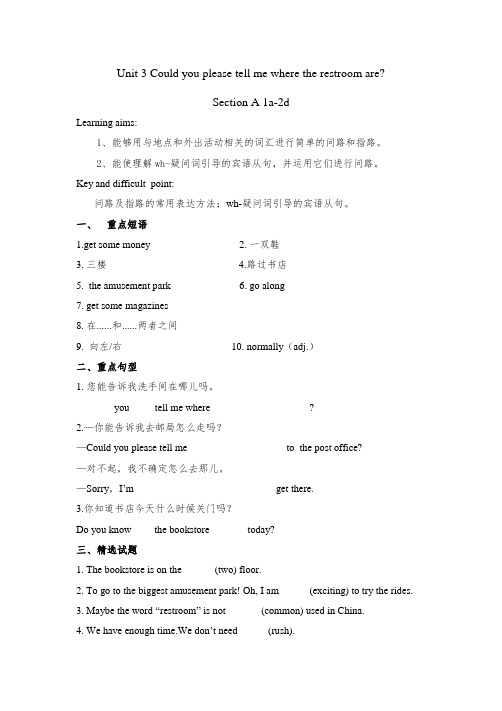人教版九年级英语精品学案 第三单元
- 格式:doc
- 大小:51.50 KB
- 文档页数:5

2020年人教版英语九年级Unit3 Could you please tell me where therestrooms are?Section B 3a-3c【课型】新授课【学习目标】1. 继续学习宾语从句;运用宾语从句写一封咨询信件2.运用宾语从句写一封咨询信件【重点】运用宾语从句写一封咨询信件【难点】运用宾语从句写一封咨询信件【教学准备】多媒体【教学过程】一、预习检测作文内容提示自读3a表格,看看本文需要从哪些方面入手?Topic QuestionThe course you will studyThe time of courseWhere and what can you eatWhere will you stayWhat activities you can doTravel to the schoolOther填写表格,提出问题Topic QuestionThe course you will study What will I study?The time of course When will I start and how longWill I study every day?Where and what can you eat Where and what can I eat ?Where will you stay Where will I stay ?What activities you can do What activities can I do ?Travel to the school How will I get to the school ?Other How much money will I bring ? What’s the weather like there ?Where are you ?------What’s your name ? ------How can I go to the school ? ------Will you pass a pen ? ------May I borrow your bike ? ------三、自主探究,讨论交流讨论怎样把这些问题变得更有礼貌Topic Question More polite questionThe course you will study What will I study? Could you please tell me what I will studyThe time of course When will I start and how longWill I study every day? Please let me know when I will start and how long I will study every day?Where and what can you eat Where and what can I eat ? I wonder Where and what I can eatWhere will you stay Where will I stay ? I don’t know Where I will stay,please tell me.What activities you can do What activities can I do ? I also wonder What activities I can doTravel to the school How will I get to the school ? Would you mind telling me How I will get to the schoolOther How much money will I bring ? What’s the weather like there ? Do you know How much money I will bring ? Could you possibly tell me what the weather is like there ?自读3b右框,想一想作文的段落层次四、课堂小结:将所给直接引语变为间接引语:1.. She said to us , “ I has been to New York.”She _____ _____that _____ _____ been to New York.2. We said to them, “ Have you learned French?”We ______ _____ ______ ______ _______ learned French.3. They said to us, “When do you do homework?”They asked ________ _________ _______do homework.4. “Keep quiet, children.” he said.He _______ the children _______ _______ quiet.5. “Don’t look out of the window,” she said to me.She _____me _____ _______ _______ out of the window.6. The teacher said, “The sun is bigger than the moon.”The teacher ______ that the sun _______ bigger than the moon.【检测反馈】( )1.How noisy the room is ! There are so many people______in it.A.singB.to singC.singingD.song ( )2.Do you know______?A.what he happenedB.what the matter is with himC.what happened to himD.what did he happened ( )3.Central park is a good place_________.Let’s go there this weekend.A.for have funB.have funC.having funD.to have fun ( )4.I prefer_____. But it’s usually crowded.A.go by subwayB.going by subwayC.to go by subwayD.went by subway ( )5. I love the mall. There’s always something______.A.happenedB.happeningC.happensD.happen ( )6.I don’t want to go inside the waiting hall; It’s too___. I prefer___outside though it’s a little cold.A.boring; to beB.crowded; beingte; waitD.early; waiting ( )7.This interesting book only_____me ten yuan and I______ ten month reading it.A.cost; spendB.cost; spentC.spends; costD.spent; costs ( )8.Watching TV________is bad for your eyes, dear.A.too muchB.much tooC.too manyD.many too ( )9.--Could you tell me ________? --Sorry, I don’t know. I was not at the meeting.A. what the teacher says at the meetingB. what the teacher said at the meetingC. what does the teacher say at the meetingD. what did the teacher say at the meeting【板书设计】宾语从句及知识点【后记】审核签阅:。

Unit 3 Could you please tell me where the restrooms are ?Section A 1a-2d 教学重难点学情分析本课是一节听说课。
学生通过七年级 Unit 8 Where is the office ?的学习对问题这一话题已经不再陌生,而且对此有了一定的语言积累和语言表达能力,这是本单元的优势。
此外,刚进入九年级这一阶段学生的特点是积极性比较高,英语水平发展还比较均衡,这些都有利于教学活动的开展和教学效果的实现。
与此同时作为教师要好好把握住学生的特点,积极鼓励,善于启发,乐于激发兴趣并辅以灵活多样的教学设计和丰富的活动设计,引导深入语言实践,渗透学法指导,进而引导学生逐步养成巩固原有知识的良好的习惯。
一、教学目标:1. 语言知识目标基本词汇:restroom, stamp, bookstore, postcard, pardon, washroom, bathroom, normal, rush, suggest, staff, grape, central, mail, east, fascinating,convenient, mall, clerk, corner, polite, politely, speaker, request,direction.基本句型:Excuse me, do you know where I can buy some medicine?Sure. There’s a supermarket down the street.Could you please tell me how to get to the post office?Sorry, I’m not sure how to get there.I wonder where we should go next.Could you tell us when the band starts playing this evening?You should try that new ride over there.2. 技能目标: (1)能用宾语从句礼貌的寻求帮助。

Unit 3 Could you please tell me where the restroomsare?第一课时Section A(1a-2d)I. Target Navigation【目标导航】◆Key words and phrases:restroom,stamp,bookstore,beside,postcard,pardon,washroom,bathroom,normally rush◆Key sentences:(1)Excuse me,could you please tell me where I can get some money?Yes. There is a bank on Main Street.(2)Excuse me,could you please tell me how to get to the bookstore?Sure,just go along Main Street until you pass Center Street. The bookstore is on your right,beside the bank.(3)Excuse me,do you know where I can get some postcards?Sure. Go to the second floor. There's a bookstore between the bank and the supermarket.◆Skills:能听懂谈话中涉及的询问信息的内容;用重点句型询问并谈论你自己的城镇或城市,学会有礼貌地询问信息。
◆Emotion:通过听说训练学习有礼貌地询问信息,从而培养学生礼貌待人的礼节。
II. Learning important and difficult points【学习重难点】1.用重点句型询问并谈论你自己的城镇或城市,学会有礼貌地询问信息。

Unit 3 Coud ou e where the retroom are?(第1课时)【学习目标】1知识与技能目标:1学会四会单词retroom ; tamewhere to eat; hang out; dre u e how can I get to …Coud ou te me how to get to …?2 英语中表示方位的表达有:net to 贴近,靠近coe to 在附近;on the eft/right ide 在左/右边; in the midde of 在……的中间;in front of 在……的前面;between … and …在……之间;be o 在……对面。
3 宾语从句宾语从句在复合句中作主句的宾语。
①由连接词主语谓语构成常由下面的一些连接词引导:②由that 引导表示陈述意义 that 可省略He a that he i at home 他说他在家里。
③由if , whether 引导表示一般疑问意义带有是否、已否、对否等I don’t now if / whether Wei Hua ie fih 我不知道韦华是否喜欢鱼。
④由连接代词、连接副词疑问词引导表示特殊疑问意义Do ou now what he want to bu 你知道他想要买什么吗?⑤从句时态要与主句一致当主句是一般现在时,从句根据情况使用任何时态He a that he i at home 他说他在家里。
I don’t now that he i inging now 我不知道她正在唱歌。
当主句是一般过去时,从句应使用过去某时态一般过去时,过去进行时,过去将来时,过去完成时He aid that he wa at home 他说他在家里。
I didn’t now that he wa inging now 我不知道她正在唱歌。
宾语从句三件事,时态语序连接词;主从时态要一致,陈述语序才合适;一般问句做从句,连接词if别忘记;特殊问句做宾从,特殊问词莫漏掉。

Unit 3 Could you please tell me where the restroom are?Section A 1a-2dLearning aims:1、能够用与地点和外出活动相关的词汇进行简单的问路和指路。
2、能使理解wh-疑问词引导的宾语从句,并运用它们进行问路。
Key and difficult point:问路及指路的常用表达方法;wh-疑问词引导的宾语从句。
一、重点短语1.get some money _________2. 一双鞋_____________3. 三楼_________4.路过书店 _________________5. the amusement park ___________6. go along ________7. get some magazines __________________________8. 在......和......两者之间__________________________9. 向左/右 __________ 10. normally(adj.)________________二、重点句型1. 您能告诉我洗手间在哪儿吗。
______ you_____tell me where _____ ______ _______?2.—你能告诉我去邮局怎么走吗?—Could you please tell me ______ _____ ______ to the post office?—对不起,我不确定怎么去那儿。
—Sorry,I’m______ _______ _______ ______ get there.3.你知道书店今天什么时候关门吗?Do you know____ the bookstore ______ today?三、精选试题1. The bookstore is on the ______(two) floor.2. To go to the biggest amusement park! Oh, I am _____ (exciting) to try the rides.3. Maybe the word “restroom” is not_______(common) used in China.4. We have enough time.We don’t need______(rush).5. I am excited ______(go) to Beijing.6. Do you know where the two new__________(bookstore) are?( ) 7. Could you please _____ me the way to restrooms?A.show B to show C showing( ) 8. There is a new clothes store _____ the bank ____ the middle school.A between;andB across;fromC go;along( ) 9. In the morning,many workers rush_____ go to work.A toB atC from( )10.Why are you still here? (改为复合从句)Can you tell me_____ ______ _______ still here?( )11. Could you tell me where I can buy a stamp? (改为简单句)Could you tell me _____ ______ _______ a stamp?( )12. Do you know how I can get to the park? (改为简单句)Do you know_____ ______ get to the park?精选试题答案:1.second2. excited3. commonly4. to rush5. to go6.bookstores 7-9 A A A10.why you are 11. where to buy 12. how toUnit 3 Could you please tell me where the restrooms are?Section A 3a-3bLearning Aims1.能礼貌地询问信息和提出建议;2.能用宾语从句询问更多信息;3.能运用阅读策略完成相关的阅读任务Important and Difficult Points能够礼貌地询问信息和提出建议一、重点词汇1.建议v.___________ n.________ 建议做某事______________2. 可怕的adj.___________ 惊慌的,吓坏了的adj._____________3. ``````怎么样___________4. 起初,首先 _______________5. pardon me____________6. come on ________________7. 承诺做某事____________ 8.经过,路过______________9. 在某人去···的路上_________ 10. walk up to _____________11.一名职员_______________ 12.开始做某事_____________13.a little earlier_____________ ___________________+比较级14. 忙于某事_______________________/ ____________________二、重点句型1. 我想知道我们下一步去哪儿。

UNIT 3 Could You Please Tell Me Where the Restrooms Are?一、重点短语①路过;经过____pass by________①pardon me______对不起;请原谅_______①走过书店_____walk by a bookstore_______①mail a letter______邮寄一封信_______①沿着...走______go walk along_______①on one’ s way to... _____在去...的路上_______①建议做某事____suggest doing_______① lead into a request_____提出一个请求________①做某事很方便______be convenient to do_______①look forward to… ______期盼;盼望_______二、知识点讲解1. both, all, either, neither, none 的区别(1) both ---“都”(两者)(2) all ---“都”(三者及以上)(3) either---①两者中的任何一个;②也(否定)(4) neither---“都不”(两者)(5) none---“都不”(三者及以上)Eg.①___Both____ Lucy and Kate are going to see a film tonight.②I have only one ticket, so ____either___ Lucy or Kate ___is____ (is / are) going to see a film tonight.③___All____ the students in China are going to enjoy their 7-day holiday.④--- Would you like some tea or coffee?---___Neither____. I’d like some water.⑤___None____ of us like summer, because it’s too hot.2. between 和among的区别(1) between .... and... 在...和....之间(两者)(2) among用于三者或三者以上的比较3. spend, take, cost与pay辨析(1) spend,其主语通常是人,结构为:spend time/ money doing sth. “花费时间/金钱做某事” 或spend money on sth.“在某事/某物上花费金钱”(2) take,常用it作形式主语,It takes sb. some time to do sth.“做某事花费某人多长时间”。
Unit 3 Teenagers should be allowed to choose their own clothes.单元重点知识导航Unit 318 pierce v. 刺穿;刺破18 license n. (=licence)执照;许可证18 silly adj. 愚蠢的;傻的19 earring n. 耳环19 instead of 代替;而不是20 stay up 不睡觉;熬夜22 concentrate v. 集中;聚集22 concentrate on 全神贯注;专心于22 study n. 学习研究22 design v. 设计;构想22 present n. 目前;现在22 at present 目前;现在22 opportunity n. 机会;时机22 volunteer v.& n. 自愿(做某事)志愿者22 local adj. 地方的;当地的22 experience v. 体验;经历22 member n. 成员;会员23 mess n. 混乱;脏乱23 old people's home 养老院23 sleepy adj. 困倦的;不活跃的23 reply v. 回答;答复23 newsletter n. 时事通讯;简报23 obey v. 服从;顺从24 in the way 当道的;妨碍人的24 achieve v. 完成;实现24 race v. 赛跑;比赛;n与…比赛;参加比赛24 realistic adj. 现实的;注重实际的24 taught v. teach的过去式或过去分词24 importance n. 重要;重要性24 care v. 关心;忧虑24 care about 担心关心24 succeed v. 成功;达到;完成25 point n. 要点;论点19 Kathy 凯西(A) 词汇部分1. sleepy adj. =tired困倦的,不活跃的→sleepiness n. 想睡→sleep v.& n. 睡觉,睡眠→asleep adj. 睡着的,熟睡的→sleeping adj. 睡着的n. 睡眠2. importance n. 重要,重要性→important adj. 重要的3. care v. 关心,忧虑→careful adj. 小心的,仔细的→carefully adv. 小心地,仔细地4. succeed v. 成功,达到,完成(后面搭配介词in)→success n. 成功,成就→successful adj. 成功的→successfully adv. 成功地5. reply v. 回答,答复(不及物动词,跟宾语时须接to =answer)n. 回答,答复(B) 短语部分1. stay up 熬夜2. clean up 清除,收拾干净3. on weekends = at weekends 在周末4. instead of doing sth. = rather than doing sth. 代替做某事5. not serious enough 不够严肃,不够认真(enough修饰形容词或副词时只能放在后面,但修饰名词时可以在前或在后,如enough money /money)6. at that age 在那种年龄at the age of 在……岁时(此短语可以转换为when的时间状语从句)7. concentrate on= put one’s heart into 全神贯注,专心于8. at present目前,现在9. the other day= a few days ago 前几天,几天以前(常用于过去时)10. learn from向……学习learn about /of 听说11. be strict with sb. 对某人要求严格be strict in sth. 对某事要求严格12. be good for 对……有益be good at = do well in 对……学得好,擅长(反义词be weak in)be good to = be friendly to = be kind to 对……友好(注意be kind /nice of sb. to v sth.是做某事某人真的是太好了)13. get in the way妨碍14. care about 担心,关心care for 关心,关怀,照顾1. get /have sth. done 让别人做某事Anna wants to get her ears pierced. 安娜想穿耳。
注意:get sb. to do sth. = have sb. do sth.Please get him to sit down. = Please have him sit down. 请让他坐下。
2. should be allowed to do sth. 应该被允许做某事(被动语态)Sixteen-year-olds should be allowed to choose their own clothes.应该允许16岁大的青少年选择自己的服装。
它的主动语态是:should allow sb. to do sth.3. so+助/情态动词+sb. 某人也……-- We have a lot of rules at my house.-- So do we.我家里有许多家规。
我们也是。
注意:1. 如果是否定句时,回答是“Neither /Nor+助/情态动词+sb.”2. so + sb.(pron.) +助/情态动词是“某人的确这样/如此”4. sb. seems to do sth. = It seems that clause. 某人好像做某事。
He doesn’t seem to have many friends.他好像没有许多朋友。
= He seems not to have many friends.= It seems that he doesn’t have many friends.5. That would be a good way /chance to do sth. = That would be a good way /chance of doing sth.那将是做某事的一个好方法/机会。
That would be a good way to keep both teachers and students happy.那将是让老师和学生们都高兴的一个好方法。
另:keep sb. /sth. adj./doing sth. 让某人某物保持某种状态We should keep our eyes closed while doing eye exercises.做眼保健操时我们应该闭上眼睛。
被动语态1. 被动语态的结构:be+过去分词(由be构成不同时态,具体见下面)a) 一般现在时:am/is/are +过去分词b) 一般过去时:was/were +过去分词c) 一般将来时:will/be going to +be+过去分词d) 现在进行时:is/am/are +being+过去分词e) 过去进行时:was/were +being+过去分词f) 现在完成时:have/has +been+过去分词2. 被动语态应注意:a) 只有及物动词才有被动语态,不及物动词不能构成被动语态。
b) 主动语态中有些动词,如make/see/hear/watch/feel sb. do sth.的结构,这些动词后面跟的是动词的原形,但变成被动语态后原形要变成to do的不定式结构。
如:He made the boy work for him. (主动语态)The boy was made to work for him. (被动语态)如2007年湖北咸宁市中考题:Betty is often seen ______ the old man with his housework.A. helpB. to helpC. helpedD. helps (答案为B)c) 常见的不用被动语态的动词:系动词, look /seem /appear, belong to, die, fall, happen, last, become, get(变得), feel(感觉,摸起来), sound, smell, taste, grow, cost, fit, have(有), take place, sell(vi), wash(vi), read(vi), write(vi), open(vi), close(vi), shut(vi), lock (vi), wear(vi), keep(保持), stay(保持)等d) 常见的一些词组get dressed(穿衣) get hurt(受伤) get lost(迷路)get washed(洗脸) get married(结婚)be covered with (被…覆盖)be made of (由…制成)(看得出原材料)be made by (由某人制造)be made from (由…制成)(看不出原材料)be made in (由某地制造)be used for (被用于…)be used as (被当作…使用)it is said that…(据说…)it is hoped that…(希望…)3. 几种特殊的被动语态:a)带情态动词的被动结构带情态动词的被动结构的固定句式为"情态动词(may, can, could, might, must, would, should, shall) + be + 过去分词"。
也有个别带"to"的情态动词例外,如:ought to和have to ,它们的被动结构就只能在不定式中。
例如:The debt must be paid off before next month. 那笔债务必须在下个月前付清。
The debt has to be paid off before next month. 那笔债务必须在下个月前付清。
Oil can be turned into energy by burning it. 油经过燃烧可变为能原。
You ought to be criticized for your carelessness. 你由于粗心大意应当受到批评。
b) 带双宾语的主动态变成被动态我们先来看看"带有两个宾语的主动语态句子的结构",重点看谓语部分:She sent me a novel on my birthday .主谓间接宾语直接宾语状语I allowed him an hour to finish the work .主谓间接宾语直接宾语状语从上面的分析可以看出,两个宾语分别是:直接宾语和间接宾语。